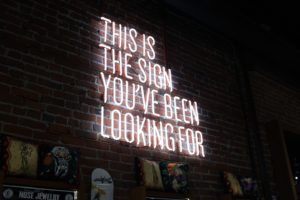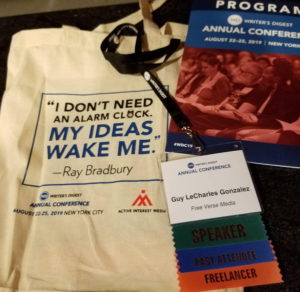
“It’s always the end of the world,” said Russell Grandinetti, one of Amazon’s top executives. “You could set your watch on it arriving.” He pointed out, though, that the landscape was in some ways changing for the first time since Gutenberg invented the modern book nearly 600 years ago. “The only really necessary people in the publishing process now are the writer and reader,” he said. “Everyone who stands between those two has both risk and opportunity.”
—“Amazon Signs Up Authors, Writing Publishers Out of Deal,” By David Streitfeld, NY Times
If you have any doubt that the NY Times is still the paper of record, watch how far and wide their latest update on Amazon’s move into “traditional” publishing spreads. While it’s a subject that’s been debated to death in publishing circles, it’s always interesting to see the response when it spills out into more public forums.
There’s an insightful comment buried in the beginning of the article, attributed broadly to unnamed Amazon executives, that perfectly sums up the true state of the publishing industry and Amazon’s position in it: “…they played down Amazon’s power and said publishers were in love with their own demise.”
Ain’t that the truth?
The dominant meme over the past several years has been the death of publishing, usually at the hands of the ebook, and the looming threat of technology partners/competitors that, as Grandinetti alluded to, presents “both risk and opportunity.” As with most memes, there’s a bit of truth mixed in there, usually buried amidst heavy doses of exaggeration, ignorance and inane snark.
While publishers in general are cautiously navigating the choppy waters of the digital shift, most are riding the strong wave of ebook sales that’s putting as much profit in their coffers as Amazon’s, while balancing a constricting (but by no means expiring) market for print books, along with a rats nest of pre-digital contracts, rights, and royalty scenarios.
Amazon moving into “traditional” publishing is certainly nothing to sneeze at, but it’s also not the end of the world for the publishing industry as we know it. By default, they immediately become a major player in the markets they enter, and because publishing is likely to be a minor revenue stream feeding the Amazon Ocean for the foreseeable future, they’re undoubtedly going to be more aggressive in making deals than a traditional publisher can be.
One could argue (and so I will), that by moving into “traditional” publishing, Amazon is simply acknowledging that content is and always will be King, and while the self-publishing angle has worked out quite well for them, only a few handfuls of authors are truly making any notable profit on $2.99 ebooks. Some of those authors have subsequently been scooped up by “traditional” publishers who are effectively doing the same thing Amazon is doing, and have been for years. (see: Celebrity novels; blogs-to-books; Amanda Hocking; etc.)
Conversely, as Amazon ramps up their “traditional” acquisitions, they’re going to learn what most publishers already know, distribution is only one piece of the puzzle, and relatively speaking, the easiest one to solve. Also, while a robust customer database and algorithms that can match those customers to books they’re interested in is a true differentiator in the digital age, it doesn’t address the one killer app for which no publisher, traditional nor newcomer, has yet nailed: consistently acquiring great books.
Instead of the typical (and oh so tired) “The sky is falling!” coverage of Amazon Publishing, the real story is that publishing is far from dead, and there are myriad opportunities for old and new players alike to reach readers through a variety of channels.
Of course, while optimism and rational thinking are good from a business perspective, they rarely translate into massive clickthroughs, so prepare yourself for more stories this week filtered through Dr. Jonathan Crane‘s skewed perspective.
Do you like email?
Sign up here to get my bi-weekly "newsletter" and/or receive every new blog post delivered right to your inbox. (Burner emails are fine. I get it!)




It reminds me of the earth shattering changes that rocked IBM’s world, when Microsoft and Apple revolutionized personal computing. IBM was the monolith that Bill Gates set sites on bringing down, but the last time I looked IBM is still going strong, albeit in a more targeted niche market than perhaps before.
I also saw on Twitter this morning a mention by an author, “I can’t have an author event on a website”, and I wonder if the Penny Marshall biography that was just signed by Amazon will only find an avenue to the market through their website? Will authors who publish through Amazon be happy if they can’t find their books anywhere BUT Amazon?
There are continuous referrals to traditional publishing as “greedy” by both wannabe self-published authors, and authors who seek to blaze a new trail being published by Amazon, without understanding of how the traditional business model really works. Sure, there can always be improvements, and certainly with the convulsions in the industry, improvements are evolving. This is a unique opportunity to illustrate just what the distinctions are in the investment that publishers have made in the marketplace with their sales forces, marketing efforts, relationships with publicity and media contacts, which is where much of that other portion of the proceeds from the sales of books is allocated. Now is not the time to downsize any sales personal or marketing and publicity efforts, but to energize them within the established market channels so that authors and readers alike can distinguish between the channels to market and choose their preferred means. It will take a dedication to the partnership of longtime bookselling/publishing relationships, but I think there is no time like the present to focus attention of the strengths inherent therein.
Yes, “greedy publishers” are one of my favorite memes, because you know, Amazon, Apple, et al, are such wonderful non-profit organizations! 😉
At the end of TOC 2010, Tim O’Reilly made an interesting pivot, exhorting publishers to focus on “the boring stuff… be really good at production, distribution, pricing, channel management, marketing, and sales,” those activities where they add value to the process and aren’t as easily disintermediated. While Amazon has mastered a number of those, it’s primarily been via one channel: their own. There’s no guarantee they’ll be good at the other stuff, just like Apple turned out to not be so good at ebooks and social networking.
Thanks for this post. I thought the NYT article was useful in making the broad point–which may not be obvious to all readers–that Amazon is not just a big online store but a publisher in its own right. I’d like to see more coverage of the range of reactions that Amazon provokes among publishers–and how different kinds of publishers interact with Amazon and manage the risks. There’s a spectrum of response, and many kinds of wariness that stop short of sky-is-falling panic.
The NYT article wasn’t “bad,” it was just a little off-key, IMO, primarily because of its attempted breadth. Streitfeld tried to cover a lot of ground, and ended up skewing towards the predominant narrative of DOOM! instead of the more interesting angle of growth and competition. That it’s filed under “Technology,” I guess it’s not a surprise since we all know new technologies ALWAYS kill the old ones. Oh, wait… 😉
The problem with the angle you’re interested in (and I am, too), is few will go on the record with anything other than variations on “valued partner,” so instead, we get unattributed inferences of fear and loathing.
Catch 22!